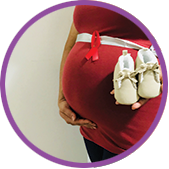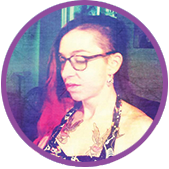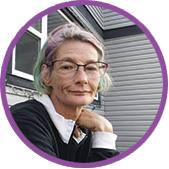If your best friend was diagnosed with HIV, what would you want her to know?
Interviews by RonniLyn Pustil
 |
AYESHA, 36Regina |
First, I would thank her for confiding in me. I’d want her to know that her HIV wouldn’t change anything between us. I would still love and respect her.
I would want her to know that whatever emotions she is feeling—shock, anger, sadness, shame—are natural and just temporary. They will go away. That’s what happened to me and to most people I talk with after they are diagnosed. Eventually you come to terms with your diagnosis.
The more you learn about the virus, the less anxious you will be. When I was diagnosed I didn’t know much about HIV and thought I would die quickly. I had lots of unanswered questions. After my husband and I came to Canada, CATIE helped a lot; we got so many resources from CATIE.
I would also want her to know that being diagnosed today is not how it was 30 years ago. Big advances have been made in HIV treatment. I would advise her to start treatment as soon as possible. The earlier you start, the better for your health. But you have to stick with it—you have to take your pills daily as prescribed by your doctor. If you adhere to your treatment and have an undetectable viral load, you won’t pass HIV to others.
It’s going to be a bit challenging because taking your meds is a daily reminder that you have HIV, but in the long run it will be better for you. It becomes like having a chronic disease, which you manage by taking your pills. Eventually it will become routine. And you can live a long, healthy, fulfilling life.
I’d tell her that I would support her however I can, but she needs other support, too. A support group for people living with HIV will really help. They exist in almost every community. Being in a support group has helped me overcome my fears and anxiety. It helps me see that I’m not alone.
I learned that getting HIV is unfortunate but it does not mean I did something wrong. I am not ashamed anymore, though I do choose to keep it confidential because of discrimination and stigma. I am no longer angry or sad, as I know I can have a normal life. I realized anyone can get HIV regardless of their gender, ethnicity, religion or whether they’re rich or poor.
Take time to breathe, take time for it to sink in. It’s up to you to decide who to tell. The people you tell might react in different ways. Disclosure is not easy.
Find something that helps you unwind and release stress and anxiety—meditation, exercise, listening to music, getting a massage—and do it. It’s important to take good care of yourself. I wish I had had someone to tell me these things when I was diagnosed.
Finally, I would tell her about my situation: I am married to an HIV-negative man and am about to have a child. HIV has not kept me back. I wanted a family and that’s what I’m getting. These days with HIV you don’t have to be sick. You can have sex, you can get married, you can have children. You can have it all.
 |
ALEXANDRA DE KIEWIT, 40Montreal |
When I was first diagnosed, I thought my emotional and sexual life was over. Who would want an HIV-positive woman? I will always remember this one episode: I wanted to tell Pops that I was HIV positive. Pops is a wonderful man who helped street youth, he was like a grandfather to me. The day I told him, he was with three of my friends. One of them, Caro, was one of those girls you wish you could be—gorgeous, radiant, with beautiful green eyes—you know, the type you envy.
After I told Pops, Caro came to see me and said, “You know, I have been living with HIV for the past 14 years.” WOW! I would have never thought that this woman could be HIV positive. It suddenly didn’t seem so big and scary!
I have now been in a relationship for the past five years. Even before that, no man ever rejected me because of my HIV. So this is what I would tell my girlfriend: Life goes on! With medication and an undetectable viral load, the risk of transmission is zero. And if the person who wants you changes their mind because you have HIV, then they don’t deserve to be with you!
JADE FARAJI, 54
Toronto
Diagnosed with HIV in 1992
First, I would tell her: You are not alone. I would ask how she is doing, how she is taking the news of being diagnosed and how she feels. And then I would disclose my status to her if she doesn’t already know it.
I would give her some basic information on HIV and tell her where to access more resources—from doctors, clinics and women’s HIV organizations—to get as much information as she can, but not to overwhelm herself. If it becomes overwhelming, just take baby steps and take time to process it.
I would encourage her to talk to her doctor so she can understand what the virus is all about and find out what her CD4 count and viral load are. I would encourage her to get some counselling and build a support network. And, of course, I’ll be here to support her if she needs anything.
I would want to tell her that she can live for so many years if she takes her meds. I’d tell her that sometimes people get tired of taking their meds every day and want to take a drug holiday, but I would encourage her not to do that. I almost died from a drug holiday.
I would talk to her about my own experiences living with HIV—how I got diagnosed, what it meant for me to go on treatment, and so on.
I would talk to her about how important it is to eat healthy, exercise, surround yourself with positive people and energy, make sure you don’t get stressed because that can affect your viral load and CD4 count, and just do things you like to do.
Some people pray, some people meditate, some do other things that make them feel grounded. What grounds me is connecting to nature. So I do a lot of camping and hiking. When I’m in the bush, in the middle of nowhere, I’m at peace. I would tell her: Find what grounds you and talk to someone when you feel sad. It will help you through stress or depression.
 |
MONICA HOPKINSON, 44Calgary |
If my best girlfriend were diagnosed with HIV, I would reassure her that she can still lead a normal life. That it is no longer a death sentence since HIV medications have come a long way. I’ve had no side effects or problems with the medications I’m on now (three pills a day) and my viral load is undetectable.
I would want her to know that undetectable=untransmittable.
That she can still have children and a family. My first husband passed away and I have since remarried and had two children—one is 24 and the other is 15—both HIV negative.
That there are agencies out there where she can get information and support. My older sister was my biggest support when I was diagnosed. I told her right away. She’s been there for me through everything—when I was taking care of my husband, when he passed away, and when I was in and out of the ER she drove from B.C. to be there for me.
I would tell my friend that she does not need to disclose to people until she is ready. When my first husband and I were first diagnosed, we lost a lot of friends because of stigma. After he passed away, I started going to the HIV organization here in Calgary and I started disclosing more. Then I started visiting schools and telling students my story.
I would tell my friend to take care of herself, take time for herself and, most of all, stay positive. I don’t look at HIV as a sickness. I am living my life like a healthy person. I don’t even think about the HIV that much. Yes, I have to take medications, but that’s it.
Last but not least, I would tell her that I will be there for her every step of the way, no matter what.
